The Bachelor of Science in Marine and Environmental Science provides students with a broad understanding of the concepts and principles that guide the current understanding of marine environments with a multidisciplinary approach that investigates problems facing our environment today.
Program Overview
This program effectively prepares students for a career or advanced degrees in marine or environmental sciences, while learning how to effectively develop, execute and communicate scientific findings to broad audiences. The program pairs discipline-specific knowledge with the teaching of analytical and laboratory skills that are transferable across a wide variety of careers and integrates experiential career learning opportunities, inspiring a career of lifelong learning and professional development.


What You Will Learn
The Marine and Environmental Science program prepares students to:
- Understand the fundamental biological principles that govern the natural world
- Analyze and apply problem-solving strategies in the context of the scientific method to make observations and pose questions to further our understanding of the biological and marine world
- Critically evaluate and effectively communicate the results of scientific practice and research to professional communities and the general public both orally and through writing
The Mitchell Difference
Earning a degree at Mitchell College requires a combination of coursework and experiential learning built around our Abilities Model. This skills-based learning approach includes the following: First Year Experience, Integrative Career Development, Core curriculum, Major curriculum and exploratory electives. Every program at Mitchell offers unique opportunities to our broad spectrum of students for their educational, occupational and lifestyle pursuits.
The Marine and Environmental Science program features:
- Hands-on Learning as a way for students to explore, retain and experiment within their field of study, such as:
-
- Measuring dune height changes on Mitchell Beach
- Examining the decomposition of “plant-based” versus “regular” plastic bags in Mitchell Woods
- Determining the composition of fish species using seine nets at Mitchell Beach
- Invasive plant removal from Mitchell Beach dunes
- Deploying research experiments and collecting invertebrates using paddle boards along Mitchell Docks
- Seaweed “Art”
-
- Wraparound Supports that offer resources and promote community-building within the learning process
- Organizations and Activities to build community with peers, learn and have fun
- Internship opportunities offering real-world experience to enhance our students’ educational journey including:
-
- Denison Pequotsepos Nature Center (Mystic, CT)
- New England Science and Sailing Foundation (Stonington, CT)
- Mystic Aquarium (Mystic, CT)
- F.R.E.S.H. New London (New London, CT)
- Harvard Campus Services Environmental Health & Safety (Cambridge, MA)
- Groton Utilities Water Treatment Plant (Groton, CT)
- Veolia Water Company (New London, CT)
-
- Service learning that combines learning objectives with community service in ways that benefit both the student and the community
- Research that offers students the opportunities to delve deeper into subject areas of interest with faculty guidance
- Minor and/or Microcredential(s) allowing students more compact, narrowly-focused courses to develop specific skills in their area of study

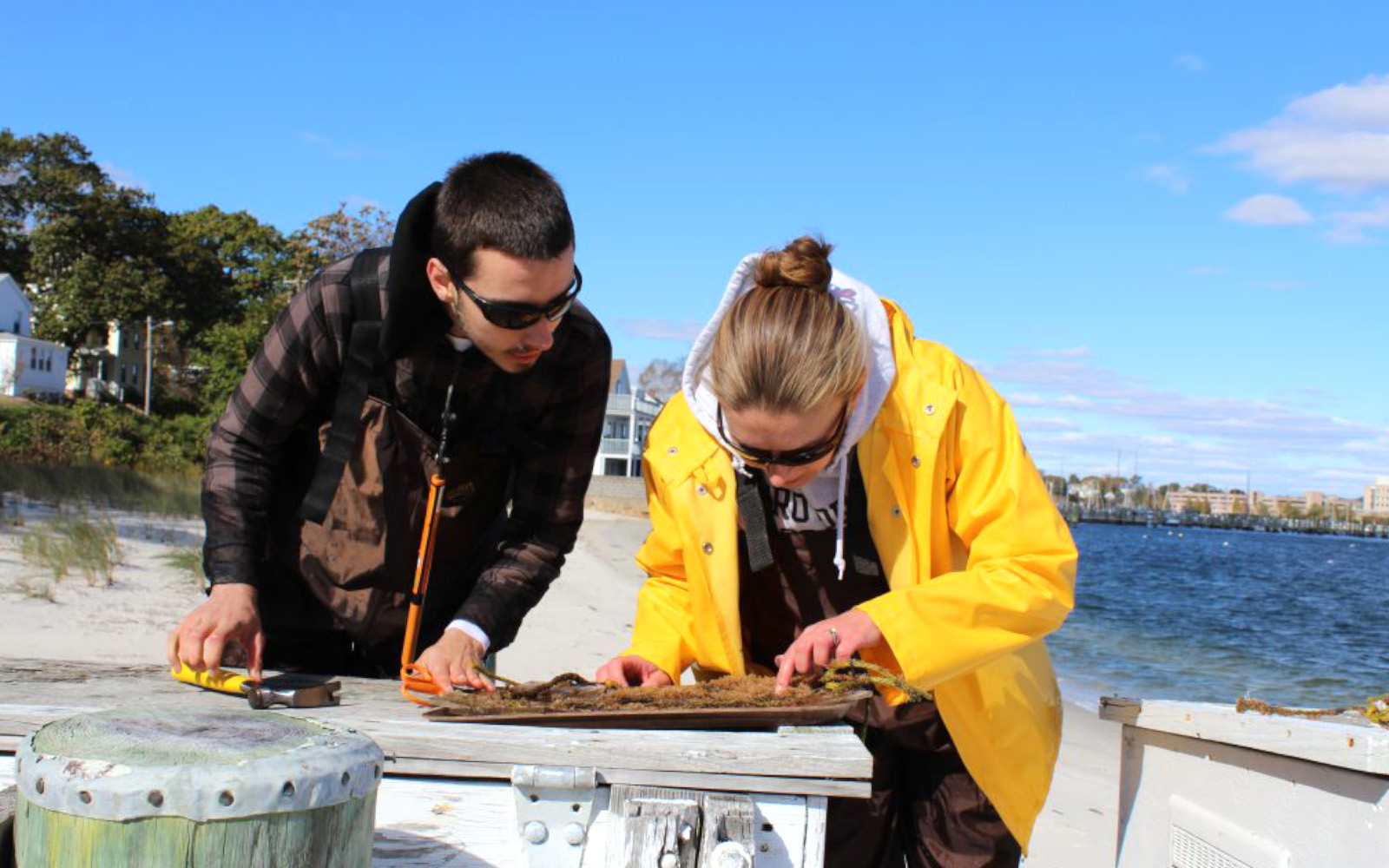

Career Pathways
The Marine and Environmental Science program prepares students for a wide variety of marine and land-based careers in:
- Research
- Government
- Outreach/education
- Non-profit organizations
- Graduate study
Graduates of the Science program have gone on to pursue advanced educational degrees or certification programs, while other students have pursued careers directly, gaining employment at organizations such as:
- Electric Boat
- Environmental Health and Safety, University of Massachusetts Medical School
- Groton Water Treatment
- Veolia Water Treatment
Ahmani Brown, who studied marine biology at Mitchell, took part in the Research Experiences for Undergraduates program, a collaboration between Mystic Aquarium and the University of Connecticut (UConn) Avery Point, funded by the National Science Foundation. Through his internship, Ahmani realized that he wanted to continue on to graduate school after Mitchell to do more research and conduct his own experiments. From the Caribbean nation Antigua and Barbuda, Ahmani considered Mitchell College a home away from home.
Video Courtesy of Mystic Aquarium
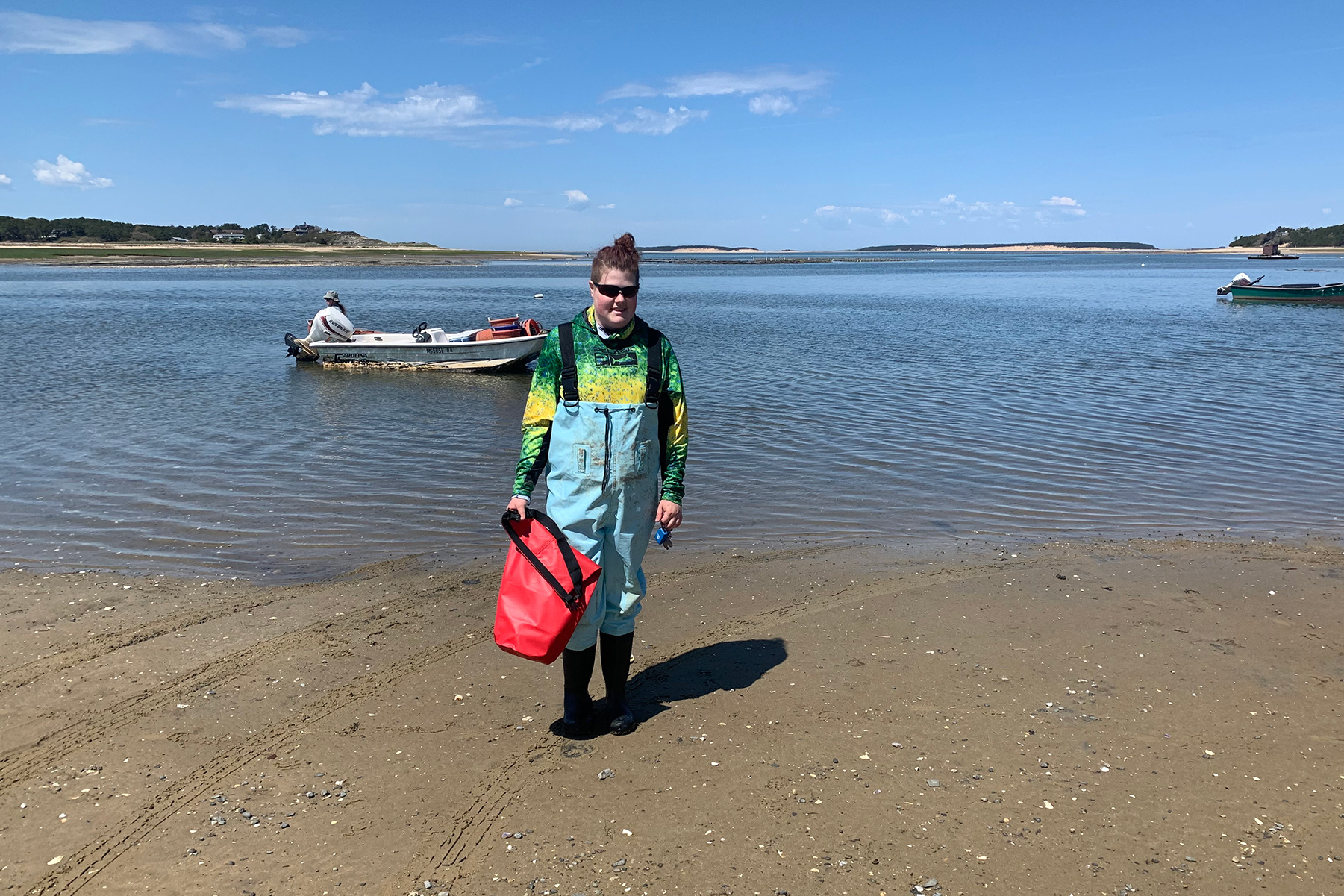
Kyra Brimdyr spent a summer knee-deep in pursuit of her passions – working on an oyster farm on Cape Cod. Her internship at Avery Oyster Company in Wellfleet, Massachusetts, gave Kyra, who is studying marine biology, an opportunity to exercise her interest and build skills as both a biologist and environmentalist, as she sees the interconnectedness of the natural environment close up.
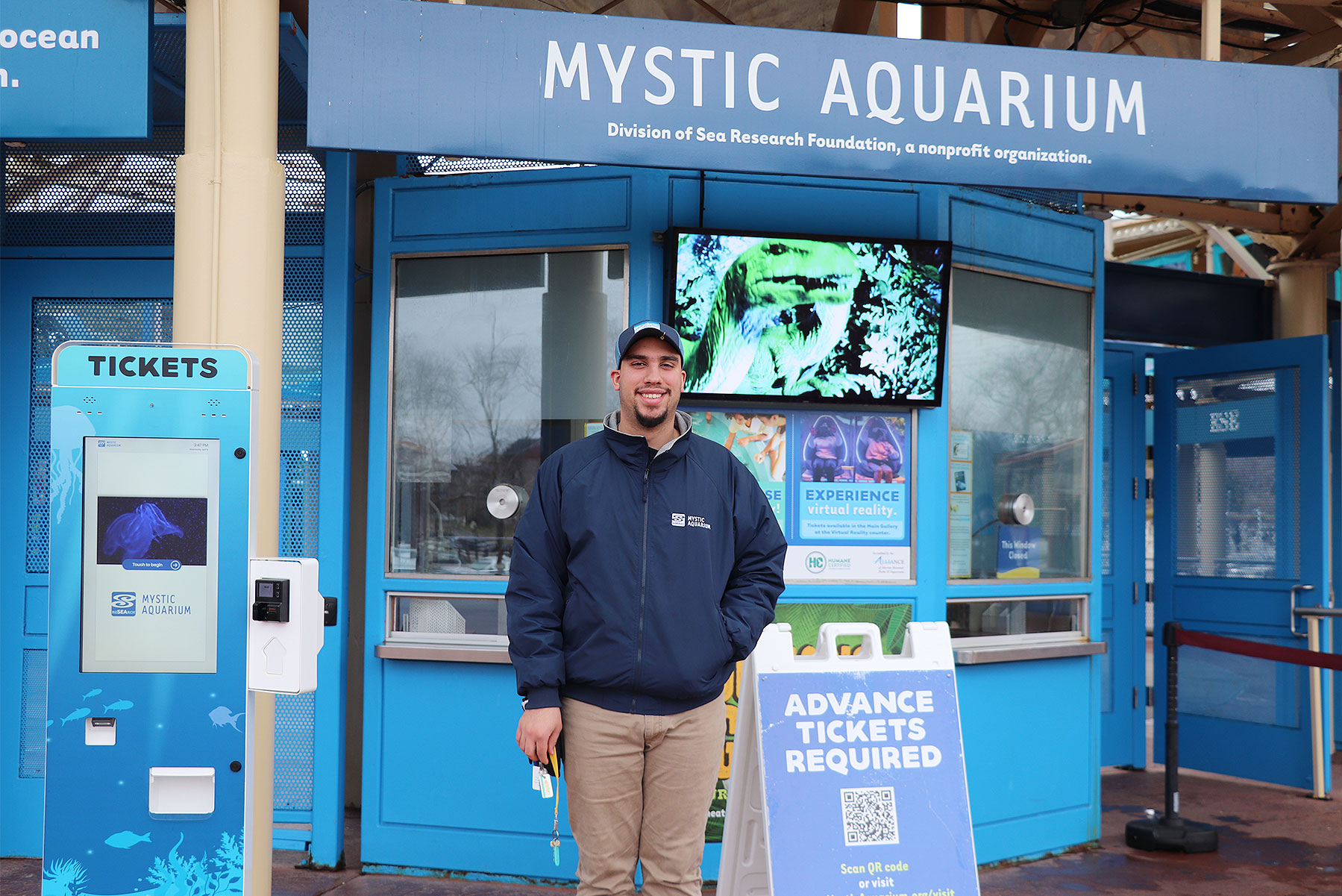
Dev Surprenant, an environmental studies major, interned at the Mystic Aquarium in his top-choice area: the Fish and Invertebrates department. The internship helped him gain an understanding of how to put his hands on something and figure out how it works rather than by looking at a diagram.
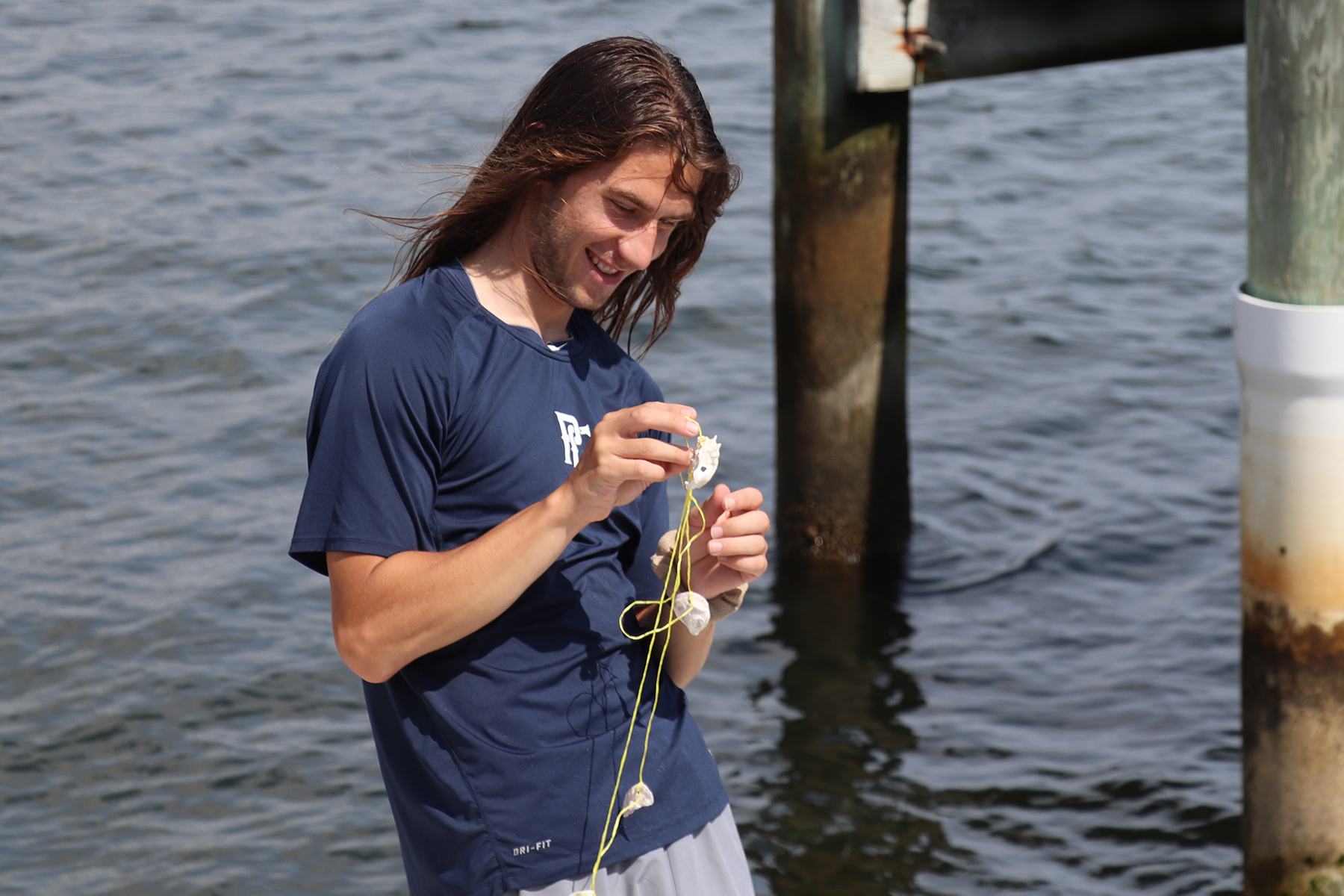
Tyler Daly was a research assistant for Dr. Christine Ramsay, associate professor of life sciences, as part of a grant-funded project (by Southeastern New England Educational and Charitable Foundation) investigating the impact of marine invasive species in local waters. Tyler’s research focused on bryozoans — “marine fouling” organisms that have made their way to the Thames River from warmer southern waters and caused damage.
“I am elated to be doing this work. I love the fact that I am being exposed to exactly what research and possibly a job in this field would look like.”
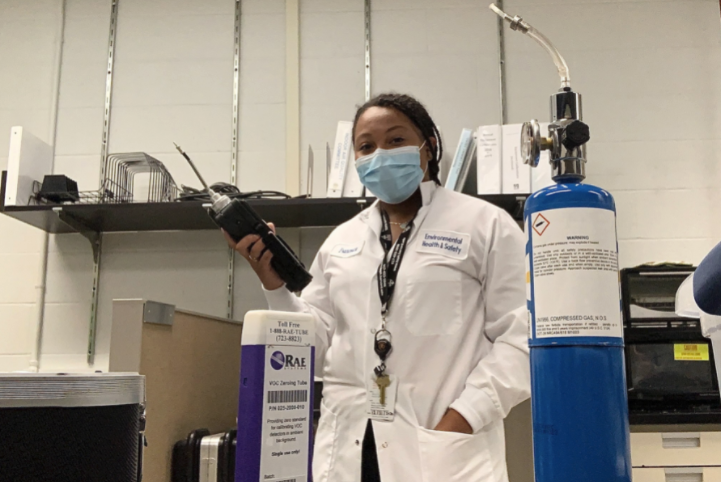
Francesca Pinard ‘19 recognized the cause-and-effect nature of environmental science, the field she studied as a student at Mitchell College and in which she earned her bachelor’s degree magna cum laude. Today, working in her dream job as an environmental health and safety specialist at the University of Massachusetts Medical School and Medical Center, Francesca deals with hospital compliance for industrial hygiene and occupational health and safety.
“I first wanted to do marine biology, and Mitchell had a beautiful beach and a well-staffed science department. I decided environmental science could be a good gateway. Through my classes each semester, my interest in environmental science grew, and I am very glad I stuck with it.”
Sample Coursework: 4-Year Overview
View the College Catalog for full descriptions of these courses.
| Year 1 | |||
| Fall Semester | Cr. | Spring Semester | Cr. |
| BI105 – Biology I | 4 | BI106 – Biology II | 4 |
| BI145 – Marine Biology | 4 | ES101 – Intro to Environmental Studies | 3 |
| CW101 – Intro to College Writing | 3 | CW102 – College Writing/Research | 3 |
| FC101 – Seminar I: Compass | 3 | FC102 – Seminar II: Journey | 3 |
| Explore Elective | 3 | FC105 – New London: Then & Now | 3 |
| Fall Credits: | 17 | Spring Credits: | 16 |
| Total First Year Credits | 33 | ||
| Year 2 | |||
| Fall Semester | Cr. | Spring Semester | Cr. |
| SC220 – Scientific Writing | 3 | BI2xx – Advanced Biology Elective | 3 |
| CH111 – Chemistry I | 4 | SC230 – Science Career Seminar | 3 |
| MA105+ – College Algebra | 3 | CH112 – Chemistry II | 4 |
| Gen Ed Theme Course | 3 | Explore Elective | 3 |
| Explore Elective | 3 | ||
| Fall Credits: | 16 | Spring Credits: | 13 |
| Total Second Year Credits | 29 | ||
| Year 3 | |||
| Fall Semester | Cr. | Spring Semester | Cr. |
| BI301 – Ecology of Long Island Sound | 3 | BI306 – Marine Invertebrate Zoology | 3(4) |
| BI303 – Ecology of Marine Plants | 3(4) | SC331 – Research Methods in Science | 3 |
| SC330 – Biostatistics | 3 | Gen Ed Theme Course | 3 |
| Gen Ed Theme Course | 3 | Explore Elective | 3 |
| Explore Elective | 3 | Explore Elective | 3 |
| Fall Credits: | 15 | Spring Credits: | 15 |
| Total Third Year Credits | 30 | ||
| Year 4 | |||
| Fall Semester | Cr. | Spring Semester | Cr. |
| BI405 – Marine Mammals Seminar | 3(4) | BI410 – Evol. & Diversity of Fishes | 3(4) |
| SC4xx – Ethics in Science | 3 | SC415 – Communicating Science | 3 |
| Humanities Elective | 3 | IN450 – Science Internship | 3 |
| Explore Elective | 3 | Social Science Elective | 3 |
| Explore Elective | 3 | Explore Elective | 3 |
| Fall Credits: | 15 | Spring Credits: | 15 |
| Total Fourth Year Credits | 30 | ||
| Total Credits to Graduate: | 122 | ||
Ready for the Next Step?
REQUEST MORE INFORMATION